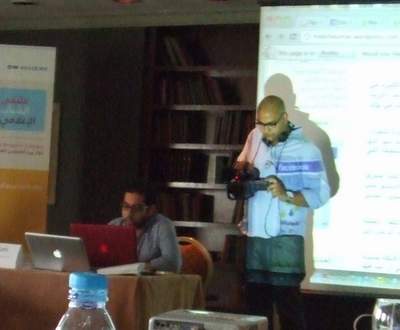... newer stories
Mittwoch, 25. Mai 2011
yms: Twitter
urmila, 02:34h
Almost all of the participants have twitter accounts. And many of them twitter during the whole day. I have to admit twitter for me is still a new technology, I neither write nor read. And I can think of scenarios were synchronous twittering is important. So, for example, there will be protests on the Tahrir Place on Friday. I understand that twittering is a good way of mobilising and spreading news during the protests. But why is anybody interested in live comments from our summit? Nobody can join, the information could also be spread later. Why twittering from the conference? I have read some of the tweets during the sessions and did not find an answer to my questions. I also do not get the point of just quoting one phrase from a talk. In this form decontextualised they do not make much sense for me. Writing and reading the tweets would take my concentration away from what is being said. And I also have the feeling that information can be spread too quickly with the web community, before one is really thinking about whether this is secure for all those involved.
I know that this post can be read as a conservative rejection of a new technology. And there might be some truth in this, because it is a technology I do not use. But at the same time I claim that we have to think about when synchronity of reporting makes sense and when maybe it is not so important or even a bad idea. Only because we have a technology we do not have to use it for all purposes and all the time.
And I am still wondering what the tweet of one of the participants that she is hiding her anti-feminism as so many participants are talking about feminism is meant to do. Is it making a statement against feminism for the other participants, who can follow the tweets, and is thus the opposite of hiding? If so, why is there the claim of hiding? I obviously do not get it.
PS 29.11.11: Currently the next Young Media Summit is staged in Tunis. Since I was a participant at the last one and I know some of the participants of the current one, I am interested in what is happening there. Thus I once in a while check their tweets and the Facebook site. Unfortunately, my impression from above, however, gets confirmed. The tweets provide me with totally unsatisfying information. Lots of it is totally uninteresting to me (in particular the advertisment posts in between for yms) and what is interesting is far too brief to get an impression of what is happening. Thus I have still not progressed in understanding why one should tweet from such a conference and why one should read the tweets.
I know that this post can be read as a conservative rejection of a new technology. And there might be some truth in this, because it is a technology I do not use. But at the same time I claim that we have to think about when synchronity of reporting makes sense and when maybe it is not so important or even a bad idea. Only because we have a technology we do not have to use it for all purposes and all the time.
And I am still wondering what the tweet of one of the participants that she is hiding her anti-feminism as so many participants are talking about feminism is meant to do. Is it making a statement against feminism for the other participants, who can follow the tweets, and is thus the opposite of hiding? If so, why is there the claim of hiding? I obviously do not get it.
PS 29.11.11: Currently the next Young Media Summit is staged in Tunis. Since I was a participant at the last one and I know some of the participants of the current one, I am interested in what is happening there. Thus I once in a while check their tweets and the Facebook site. Unfortunately, my impression from above, however, gets confirmed. The tweets provide me with totally unsatisfying information. Lots of it is totally uninteresting to me (in particular the advertisment posts in between for yms) and what is interesting is far too brief to get an impression of what is happening. Thus I have still not progressed in understanding why one should tweet from such a conference and why one should read the tweets.
1 Kommentar in: youngmediasummit ... comment ... link
yms: First priority media coverage
urmila, 02:19h

There is a video journalist following out conference. He is there most of the time, standing just in front of the speaker in order to get a good footage, holding his camera next to my head, disturbing a discussion. For me this filming seems very invasive. I am fine that I am filmed, but I do not want the camera and the video journalist to be so dominant. I want to listen and discuss in this group -that is my first priority. For me the filming should be of lower priority. Does film coverage have to be so invasive? Is media coverage more important than the event itself?
0 Kommentare in: youngmediasummit ... comment ... link
yms: Classist
urmila, 02:13h
The venue of our conference is very posh. It is the Mariott Zamalek in Cairo. And the reason for choosing this place is also acceptable: there are both conference rooms and internet access for all. But it also represents the privileges we all have. We sit here in this posh place, all costs covered, our travel expenses covered as well and all (but one, whose passport was not valid for six months more) got visas. We sit in this room and almost all of us have a notebook/ netbook / Macbook in front of us. Many have smart phones. The habitus of most indicates being situated in the upper middle class or upper class.

I engage with one in a discussion about migrant (domestic) workers (because I am interested in migrants from South Asia to this region) and talk about our privileges and their marginalisations. She gets into a very defensive mode, arguing that the domestic workers are treated well (since they are trusted the kids) and they give wrong accusations about being mistreated by their employers. She adds that she is working hard for her income as well and is not rich. That she can afford a driver, her sister has a domestic servant for her kids, who comes along to London, were they have a flat, etc. just seems normal to them.
Also another claims not to be rich, just comfortable. She drives a good car, has a blackberry, a very upper class habitus and the impression that the poor are less educated and thus more religious/ conservative.
These people are active in supporting the Arab revolutions, women's rights, etc., they are nice people and do good things. But I have a feeling that they do not question their class privileges much (I do that also much too little), that they reproduce classist exclusions and I ask myself, what consequences it has when it is these people who not only raise their voices but are also heard. And what it means that we privileged meet and network. What exclusions are we reproducing together?

I engage with one in a discussion about migrant (domestic) workers (because I am interested in migrants from South Asia to this region) and talk about our privileges and their marginalisations. She gets into a very defensive mode, arguing that the domestic workers are treated well (since they are trusted the kids) and they give wrong accusations about being mistreated by their employers. She adds that she is working hard for her income as well and is not rich. That she can afford a driver, her sister has a domestic servant for her kids, who comes along to London, were they have a flat, etc. just seems normal to them.
Also another claims not to be rich, just comfortable. She drives a good car, has a blackberry, a very upper class habitus and the impression that the poor are less educated and thus more religious/ conservative.
These people are active in supporting the Arab revolutions, women's rights, etc., they are nice people and do good things. But I have a feeling that they do not question their class privileges much (I do that also much too little), that they reproduce classist exclusions and I ask myself, what consequences it has when it is these people who not only raise their voices but are also heard. And what it means that we privileged meet and network. What exclusions are we reproducing together?
2 Kommentare in: youngmediasummit ... comment ... link
yms: Heterogenous perspective
urmila, 02:00h
In Germany a rather simple image of the Arab world dominates. All are the same, Muslim, etc. That this is a wrong image is nothing very surprising. But I am really glad to have the opportunity to spend three days with 11 bloggers/ journalists from eight different Arab countries. Already the first day showed the different perspectives they have, their different involvement in political struggles and different approaches. As a gender studies scholar I am in particular fascinated by the different feminist approaches, which encompass both those who firmly believe in the dichotomy of women and men as well as heterosexuality to those who question heteronormativity and fight for the rights of the non-heteronormative. It was also interesting to see how two bloggers engaged in the struggle for women's rights in two different countries got into a rather fierce argument about what the right way is. To be precise one of them had the feeling (and I think she was right there) that her home country was taken as the place, which treats women particularly badly, and reacted by defending it (although I later got the experience that she is rather critical of her country). This debate could also have been initiated by a mainstream German, who is anti-muslim, and a woman from the Arab world - but it was among two Arab women.
I am learning lots and ask lots of questions.
I am learning lots and ask lots of questions.
0 Kommentare in: youngmediasummit ... comment ... link
... older stories
 Foto: © Anke Illing
Foto: © Anke Illing


